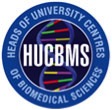Bangor Academic chosen to represent Wales on UK’s Biomedical Sciences representative body
 Mr Merfyn Williams, course director of the BSc Biomedical Science degree in the School of Medical Sciences has had the honour of being invited to join the Heads of University Centres of Biomedical Sciences (HUCBMS) Executive Committee.
Mr Merfyn Williams, course director of the BSc Biomedical Science degree in the School of Medical Sciences has had the honour of being invited to join the Heads of University Centres of Biomedical Sciences (HUCBMS) Executive Committee.
HUCBMS is a representative body for the biomedical sciences in the UK and has a membership of over 60 universities, which includes Bangor University, within the UK and overseas. Its mission is ‘to promote thedevelopment and enhancement of biomedical sciences teaching and research’.
Merfyn, who holds a joint post with Public Health Wales for BCUHB, is looking forward to applying his extensive teaching and clinical experiences to help ensure the continued quality of biomedical science teaching and research in the UK and beyond. Merfyn said” I am delighted to have been invited to join such a prestigious committee within this field and it was great meeting up with other committee members at the Institute of Biomedical Sciences in London recently and helping plan the programme for the annual conference in Plymouth in September.”
Prof. Dean Williams, head of the School of Medical Sciences said “Merfyn’s invitation to join this committee as the representative from Wales is an indication of the esteem with which he and the Biomedical Sciences teaching and research at Bangor is held in. I am sure that Merfyn will prove to be as valuable an asset to the HUCBMS during his tenure on the committee as he has been to the University and BCUHB.”
The School of Medical Sciences has a number of undergraduate and postgraduate degree courses in this field including Biomedical Science BSc, Medical Sciences BMedSci and Medical Molecular Biology with Genetics MSc.
Bangor is also planning on joining the small number of UK universities who currently offer Physician Associate masters’ programmes. This is a rapidly growing healthcare role in the UK, working alongside doctors in hospitals and in GP surgeries. Physician Associates support doctors in the diagnosis and management of patients and are trained to perform a number of roles including: taking medical histories, performing examinations and analysing test results.
Publication date: 22 February 2016
